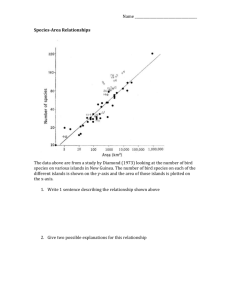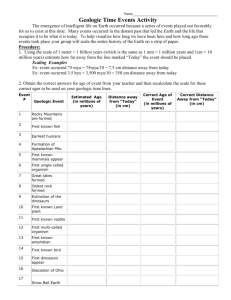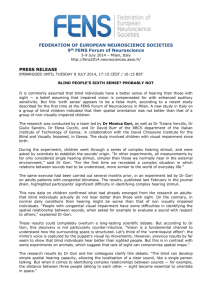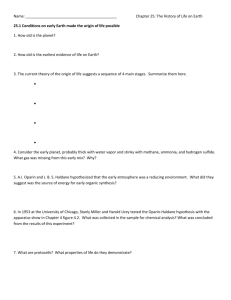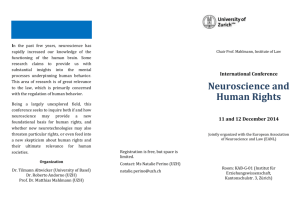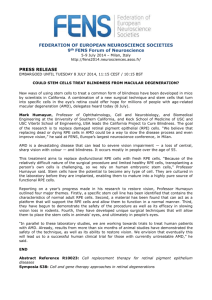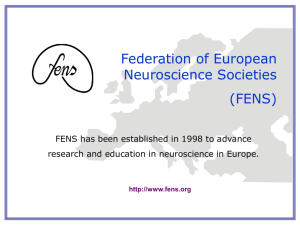ramping up resilience against fear
advertisement
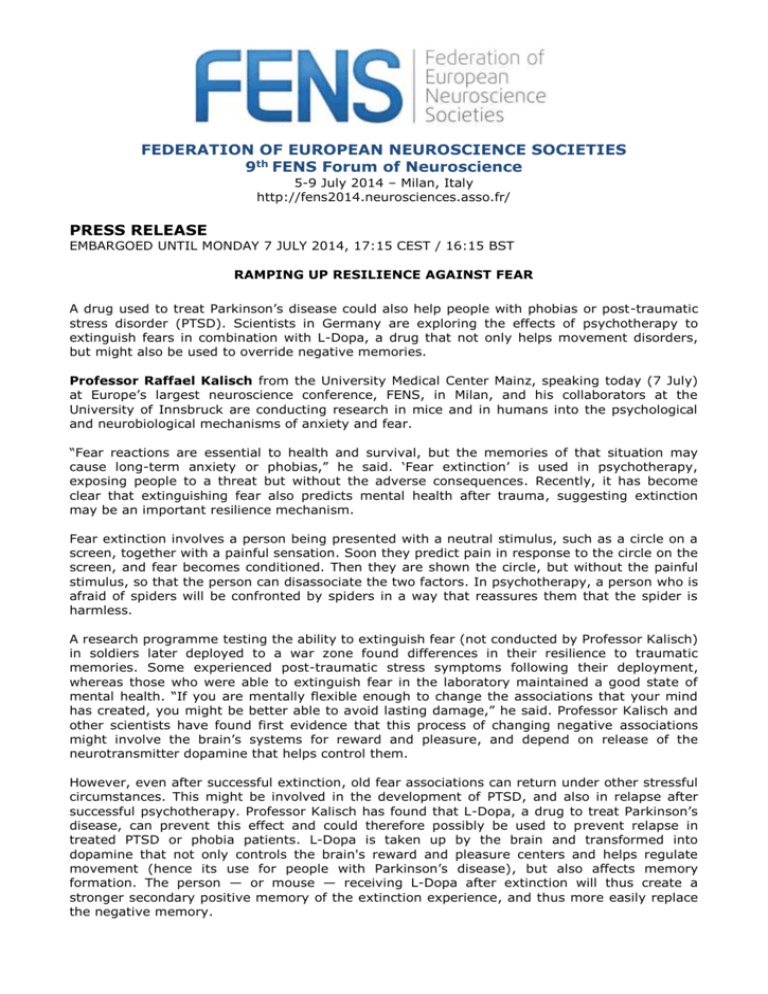
FEDERATION OF EUROPEAN NEUROSCIENCE SOCIETIES 9th FENS Forum of Neuroscience 5-9 July 2014 – Milan, Italy http://fens2014.neurosciences.asso.fr/ PRESS RELEASE EMBARGOED UNTIL MONDAY 7 JULY 2014, 17:15 CEST / 16:15 BST RAMPING UP RESILIENCE AGAINST FEAR A drug used to treat Parkinson’s disease could also help people with phobias or post-traumatic stress disorder (PTSD). Scientists in Germany are exploring the effects of psychotherapy to extinguish fears in combination with L-Dopa, a drug that not only helps movement disorders, but might also be used to override negative memories. Professor Raffael Kalisch from the University Medical Center Mainz, speaking today (7 July) at Europe’s largest neuroscience conference, FENS, in Milan, and his collaborators at the University of Innsbruck are conducting research in mice and in humans into the psychological and neurobiological mechanisms of anxiety and fear. “Fear reactions are essential to health and survival, but the memories of that situation may cause long-term anxiety or phobias,” he said. ‘Fear extinction’ is used in psychotherapy, exposing people to a threat but without the adverse consequences. Recently, it has become clear that extinguishing fear also predicts mental health after trauma, suggesting extinction may be an important resilience mechanism. Fear extinction involves a person being presented with a neutral stimulus, such as a circle on a screen, together with a painful sensation. Soon they predict pain in response to the circle on the screen, and fear becomes conditioned. Then they are shown the circle, but without the painful stimulus, so that the person can disassociate the two factors. In psychotherapy, a person who is afraid of spiders will be confronted by spiders in a way that reassures them that the spider is harmless. A research programme testing the ability to extinguish fear (not conducted by Professor Kalisch) in soldiers later deployed to a war zone found differences in their resilience to traumatic memories. Some experienced post-traumatic stress symptoms following their deployment, whereas those who were able to extinguish fear in the laboratory maintained a good state of mental health. “If you are mentally flexible enough to change the associations that your mind has created, you might be better able to avoid lasting damage,” he said. Professor Kalisch and other scientists have found first evidence that this process of changing negative associations might involve the brain’s systems for reward and pleasure, and depend on release of the neurotransmitter dopamine that helps control them. However, even after successful extinction, old fear associations can return under other stressful circumstances. This might be involved in the development of PTSD, and also in relapse after successful psychotherapy. Professor Kalisch has found that L-Dopa, a drug to treat Parkinson’s disease, can prevent this effect and could therefore possibly be used to prevent relapse in treated PTSD or phobia patients. L-Dopa is taken up by the brain and transformed into dopamine that not only controls the brain's reward and pleasure centers and helps regulate movement (hence its use for people with Parkinson’s disease), but also affects memory formation. The person — or mouse — receiving L-Dopa after extinction will thus create a stronger secondary positive memory of the extinction experience, and thus more easily replace the negative memory. So this raises new questions about the role of primary fear memories and secondary prevention by L-dopa. “We would like to be able to enhance the long-term effects of psychotherapy by combining it with L-Dopa,” he said. To this end, Professor Kalisch is about to start a clinical study of people with a spider phobia to determine the effects of L-dopa on therapy outcome. “Manipulating the dopamine system in the brain is a promising avenue to boost primary and secondary preventive strategies based on the extinction procedure,” he said. END Abstract Reference R10221: Fear extinction as a key human resilience mechanism: dopaminergic contributions. Symposia S30: Ramping up resilience: from (epi) genetics, to optogenetics and imaging Contact FENS Press Office and all media enquiries: Elaine Snell, Snell Communications Ltd, London UK (English language) tel: +44 (0)20 7738 0424 or mobile +44 (0)7973 953 794 email: Elaine@snell-communications.net Mauro Scanu (Italian language) tel: +39 333 161 5477 email: press.office@fens.org Professor Raffael Kalisch rkalisch@uni-mainz.de NOTES TO EDITORS The 9th FENS Forum of Neuroscience, the largest basic neuroscience meeting in Europe, organised by FENS and hosted by the The Società Italiana di Neuroscienze (SINS) (Italian Society for Neuroscience) will attract an estimated 5,500 international delegates. The Federation of European Neuroscience Societies (FENS), founded in 1998, aims to advance research and education in neuroscience, representing neuroscience research in the European Commission and other granting bodies. FENS represents 42 national and mono-disciplinary neuroscience societies with close to 23,000 member scientists from 32 European countries. http://fens2014.neurosciences.asso.fr/ Further Reading (Kalisch) Single dose of L-dopa makes extinction memories context-independent and prevents the return of fear. J Haaker, S Gaburro, A Sah, N Gartmann, TB Lonsdorf, K Meier, N Singewald, H-C Pape, F Morellini, R Kalisch. PNAS Plus - Biological Sciences - Psychological and Cognitive Sciences. 2013; 110 (26): E2428-36. DOI: 10.1073/pnas.1303061110 Empirical support for an involvement of the mesostriatal dopamine system in human fear extinction. K A Raczka, A Reif; J Deckert, N Gartmann, M-L Mechias, M Pessiglione, R Kalisch. Translational Psychiatry. 2011; 1: e12. DOI:10.1038/tp.2011.10

